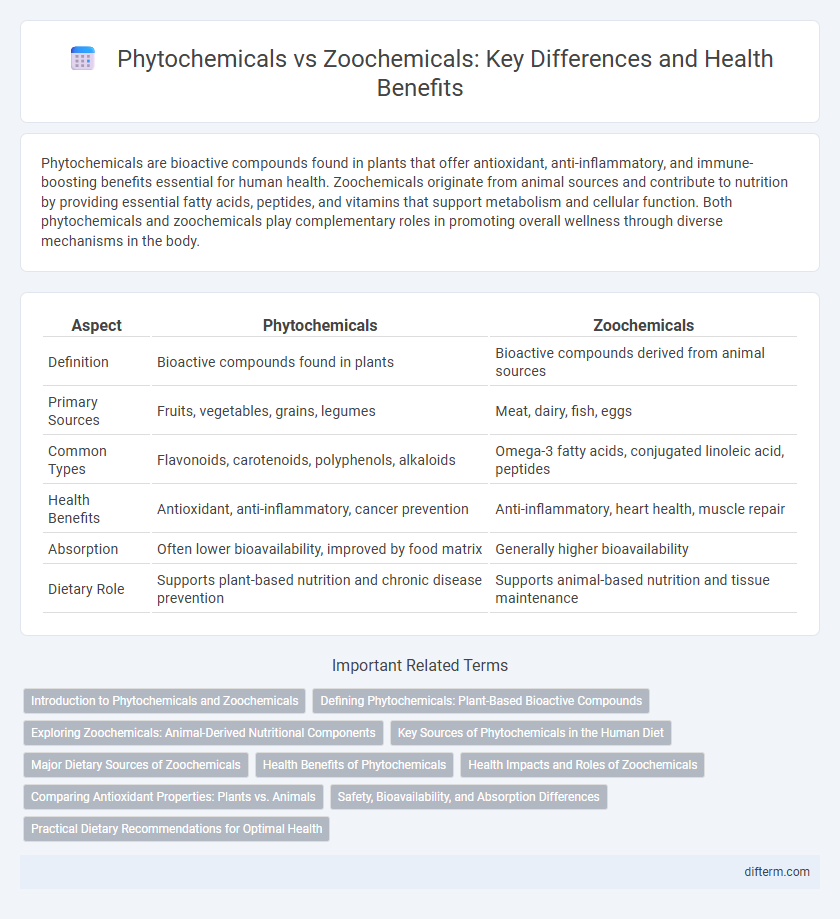Phytochemicals are bioactive compounds found in plants that offer antioxidant, anti-inflammatory, and immune-boosting benefits essential for human health. Zoochemicals originate from animal sources and contribute to nutrition by providing essential fatty acids, peptides, and vitamins that support metabolism and cellular function. Both phytochemicals and zoochemicals play complementary roles in promoting overall wellness through diverse mechanisms in the body.
Table of Comparison
| Aspect | Phytochemicals | Zoochemicals |
|---|---|---|
| Definition | Bioactive compounds found in plants | Bioactive compounds derived from animal sources |
| Primary Sources | Fruits, vegetables, grains, legumes | Meat, dairy, fish, eggs |
| Common Types | Flavonoids, carotenoids, polyphenols, alkaloids | Omega-3 fatty acids, conjugated linoleic acid, peptides |
| Health Benefits | Antioxidant, anti-inflammatory, cancer prevention | Anti-inflammatory, heart health, muscle repair |
| Absorption | Often lower bioavailability, improved by food matrix | Generally higher bioavailability |
| Dietary Role | Supports plant-based nutrition and chronic disease prevention | Supports animal-based nutrition and tissue maintenance |
Introduction to Phytochemicals and Zoochemicals
Phytochemicals are natural compounds found in plants that contribute to disease prevention and overall health by acting as antioxidants, anti-inflammatory agents, and immune system boosters. Zoochemicals are bioactive substances derived from animal-based foods that support bodily functions such as cognitive health and hormonal balance through omega-3 fatty acids and conjugated linoleic acid. Both phytochemicals and zoochemicals play crucial roles in nutrition science, promoting optimal health through diverse dietary sources.
Defining Phytochemicals: Plant-Based Bioactive Compounds
Phytochemicals are bioactive compounds naturally found in plants that contribute to their color, flavor, and resistance to disease, including flavonoids, carotenoids, and polyphenols. These plant-derived substances exhibit antioxidant, anti-inflammatory, and anti-carcinogenic properties, playing a crucial role in human health by reducing the risk of chronic diseases. Unlike zoochemicals, which are animal-based bioactives like omega-3 fatty acids, phytochemicals offer diverse health benefits primarily through plant-based nutrition.
Exploring Zoochemicals: Animal-Derived Nutritional Components
Zoochemicals are bioactive compounds derived from animal sources, including omega-3 fatty acids from fish oils, which play crucial roles in cardiovascular health and brain function. Unlike plant-based phytochemicals, zoochemicals like conjugated linoleic acid and bioactive peptides exhibit unique anti-inflammatory and antioxidant properties. Research highlights their potential in chronic disease prevention, emphasizing the importance of incorporating diverse animal-derived nutrients into balanced diets for optimal health benefits.
Key Sources of Phytochemicals in the Human Diet
Phytochemicals are naturally occurring compounds found primarily in fruits, vegetables, whole grains, nuts, and legumes, offering antioxidant and anti-inflammatory benefits crucial for disease prevention. Key sources include colorful produce such as berries, tomatoes, spinach, and carrots, which contain flavonoids, carotenoids, and polyphenols that support cellular health and metabolic functions. Unlike zoochemicals derived from animal products, phytochemicals contribute to reducing oxidative stress and chronic inflammation due to their plant-based bioactive properties.
Major Dietary Sources of Zoochemicals
Zoochemicals are bioactive compounds found predominantly in animal-based foods such as fish, dairy, meat, and eggs. Key dietary sources include omega-3 fatty acids from fatty fish like salmon and mackerel, conjugated linoleic acid from grass-fed beef and dairy, and bioactive peptides from fermented dairy products. These compounds contribute to anti-inflammatory effects, improved cardiovascular health, and enhanced immune function.
Health Benefits of Phytochemicals
Phytochemicals, naturally occurring compounds in fruits, vegetables, and grains, exhibit powerful antioxidant and anti-inflammatory properties that support immune function and reduce chronic disease risk. These plant-based bioactive substances help protect against cardiovascular disease, certain cancers, and neurodegenerative disorders by neutralizing free radicals and enhancing cellular repair mechanisms. Clinical studies consistently highlight phytochemicals such as flavonoids, carotenoids, and polyphenols for their role in improving overall health and longevity.
Health Impacts and Roles of Zoochemicals
Zoochemicals, bioactive compounds derived from animal sources, play crucial roles in promoting human health by supporting immune function, enhancing brain development, and reducing inflammation. Unlike phytochemicals from plants, zoochemicals such as omega-3 fatty acids, vitamin B12, and choline are vital for neurological health, cardiovascular protection, and maintaining metabolic balance. Their unique bioavailability and specific biochemical actions make zoochemicals indispensable for preventing chronic diseases and supporting overall physiological well-being.
Comparing Antioxidant Properties: Plants vs. Animals
Phytochemicals, found in fruits, vegetables, and grains, exhibit strong antioxidant properties by neutralizing free radicals and reducing oxidative stress, which helps prevent chronic diseases. Zoochemicals, derived from animal-based foods such as fish and dairy, also provide antioxidants like carnosine and coenzyme Q10 that support cellular health and mitochondrial function. Studies indicate that while phytochemicals offer a broader spectrum of antioxidants, zoochemicals contribute unique compounds that enhance overall antioxidant defense through complementary mechanisms.
Safety, Bioavailability, and Absorption Differences
Phytochemicals, derived from plant sources, generally exhibit higher bioavailability and safer profiles due to their natural antioxidant properties and lower toxicity risks. Zoochemicals, sourced from animal products, often demonstrate greater variability in absorption influenced by their complex structures and potential contaminants. Understanding these differences is crucial for optimizing nutrient absorption and minimizing adverse effects when selecting supplements or dietary sources.
Practical Dietary Recommendations for Optimal Health
Phytochemicals, found in fruits, vegetables, and whole grains, provide antioxidant and anti-inflammatory benefits essential for preventing chronic diseases. Zoochemicals, present in meat, dairy, and seafood, contribute to optimal brain function and immune support through nutrients like omega-3 fatty acids and conjugated linoleic acid. Incorporating a balanced diet rich in diverse plant-based phytochemicals alongside moderate, high-quality animal-based zoochemicals supports overall health and reduces disease risk.
Phytochemicals vs zoochemicals Infographic

 difterm.com
difterm.com